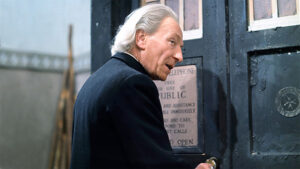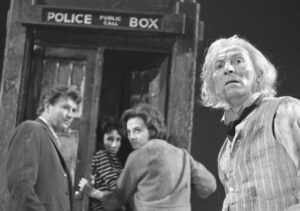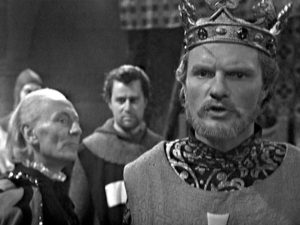Doctor Who In Perspective 1963-1966

John Hussey takes a trip back to where it all began.
“One day I shall come back. Yes I shall come back. Until then, there must be no regrets, no tears, no anxieties. Just go forward with all your beliefs and prove to me that I’m not mistaken in mine.”
William Hartnell, the original Doctor, did a fantastic job at bringing this amazing character to life. What made the First Doctor so intriguing was his character being totally mysterious and quite dark in his early days. He was portrayed as an old man who was very stern, grumpy and selfish. ‘An Unearthly Child’, the first story, sold his character perfectly through his interactions with Ian Chesterton and Barbara Wright in Totter’s Lane where he brilliantly showcased a sense of superiority in intelligence, looking down upon the humans and being rather alien within his portrayal of emotion.
 I enjoyed his character development throughout the next couple of stories which not only tested his character to his companions but also the audience. It’s a brilliant idea to have your main character fairly unlikeable because you have trust issues with them and you become more engaged in the process because you’re trying to figure them out. Within ‘The Daleks’ the First Doctor exhibited deceit to his companions in order to gain what he wanted, resulting in him putting everyone in mortal danger to the point they nearly died from radiation poisoning. The following story ‘The Edge of Destruction’ saw paranoia get the better of him, prompting him to throw Ian and Barbara off the TARDIS mid-flight after accusing them of sabotage. This story brought about a massive change in his character due to him actually apologising to Barbara for his actions.
I enjoyed his character development throughout the next couple of stories which not only tested his character to his companions but also the audience. It’s a brilliant idea to have your main character fairly unlikeable because you have trust issues with them and you become more engaged in the process because you’re trying to figure them out. Within ‘The Daleks’ the First Doctor exhibited deceit to his companions in order to gain what he wanted, resulting in him putting everyone in mortal danger to the point they nearly died from radiation poisoning. The following story ‘The Edge of Destruction’ saw paranoia get the better of him, prompting him to throw Ian and Barbara off the TARDIS mid-flight after accusing them of sabotage. This story brought about a massive change in his character due to him actually apologising to Barbara for his actions.
This character development was a clever idea and really aided in creating the foundations for the character we’ve come to love and respect this very day. In ‘The Keys of Marinus’ we actually saw the First Doctor trying to clear Ian’s name for crimes he hadn’t done, something that proved his respect towards his companions had changed from that of distrust and insults. Susan’s departure finished his character development through the poetic speech he gave at the end of ‘The Dalek Invasion of Earth’, showcasing he was able to let Susan go and trust her to undergo her own journey. He finally came full circle once Ian and Barbara made their own departure in ‘The Chase’ to which the First Doctor was sad about. Though he showed anger at first in their foolish idea of using a Dalek time machine to get home, deep down he was looking out for them and even admitted to Vicki after they’d finally got home that he would miss them dearly. It was sad in ‘The Rescue’ seeing him a little out of it due to Susan’s recent departure and it felt like the original format had changed and a new era had begun through Vicki and the arrival of Steven Taylor.
 Throughout the rest of his journey the First Doctor mellowed out into a more gentle character with his grandfatherly ways. That was the sweet part about the First Doctor, his caring nature. Because of his old appearance you always felt like he was a warm, loving grandparent, especially once his character became less alien and more understanding towards human emotion. This was one of the greatest developments of the first three and a bit seasons; it changed the Doctor into someone who could be considered a heroic figure, someone who would stand up for justice and what was right. His sense for justice bubbled up through his interactions with deadly foes, the main example being the Daleks, pushing him towards saving the day. Of course the interesting thing I liked about the First Doctor was his fragile nature and the fact his companions, especially the male ones, stood out as the main heroes of the stories because of their agility and the Doctor more served as the intelligence.
Throughout the rest of his journey the First Doctor mellowed out into a more gentle character with his grandfatherly ways. That was the sweet part about the First Doctor, his caring nature. Because of his old appearance you always felt like he was a warm, loving grandparent, especially once his character became less alien and more understanding towards human emotion. This was one of the greatest developments of the first three and a bit seasons; it changed the Doctor into someone who could be considered a heroic figure, someone who would stand up for justice and what was right. His sense for justice bubbled up through his interactions with deadly foes, the main example being the Daleks, pushing him towards saving the day. Of course the interesting thing I liked about the First Doctor was his fragile nature and the fact his companions, especially the male ones, stood out as the main heroes of the stories because of their agility and the Doctor more served as the intelligence.
Sadly, in the end, his companions Polly and Ben Jackson couldn’t prevent his ultimate demise in ‘The Tenth Planet’ where the first ever regeneration took place. By this point the First Doctor had established himself as a changed man from his original appearance in ‘An Unearthly Child’ and became a likeable character that the audience enjoyed tuning into week- in-and-out. I believe this was a great testament to superior character development over the course of different Producers and Script Editors who each helped evolve the show in its early days.
“If you could touch the alien sand and hear the cry of strange birds and watch them wheel in another sky, would that satisfy you?”
 The companions of the original era are something to be equally be praised because they really drove the story. As stated above, the First Doctor was frail and required his companions to step up to do the action. This started off with Ian who proved to be strong-minded as well as being able to hold his ground. What made his character brilliant was the fact he was just an ordinary teacher and this limited his strengths, making him vulnerable. This and of course he was the one, along with Barbara, who challenged the First Doctor’s dark nature within the earliest stories, eventually causing a dramatic change in character. It’s fantastic, when you think about it, that Ian and Barbara were the ones who created the essential character for the Doctor that everyone knows across the world today.
The companions of the original era are something to be equally be praised because they really drove the story. As stated above, the First Doctor was frail and required his companions to step up to do the action. This started off with Ian who proved to be strong-minded as well as being able to hold his ground. What made his character brilliant was the fact he was just an ordinary teacher and this limited his strengths, making him vulnerable. This and of course he was the one, along with Barbara, who challenged the First Doctor’s dark nature within the earliest stories, eventually causing a dramatic change in character. It’s fantastic, when you think about it, that Ian and Barbara were the ones who created the essential character for the Doctor that everyone knows across the world today.
Susan was a great addition to expand the alien nature of the First Doctor and their fantastical space/time ship and also granted the main character some humanity through family traits. Other than this Susan was unfortunately a weak character who was little more than a damsel on too many occasions, thereby becoming a nuisance, especially with her screaming. Barbara on occasion did this but only in the early days and later developed into a stronger character with her intelligence as a teacher being her advantage.
These traits continued into the rest of the First Doctor’s companions. Vicki, for instance, proved to be somewhat of a Susan replacement but she became instantly likeable due to her caring nature and strong character traits which the First Doctor loved, taking her in as a secondary granddaughter. A similar scenario happened to Dodo Chaplet but I find her character was less interesting and didn’t stand out as much. Steven Taylor, on the other hand, remains my favourite of the First Doctor’s companions due to his youthfulness, independent ability to do things, and his challenging nature towards the First Doctor, along with his loyalty. He was Ian Mark II essentially but with plenty of new traits to make him original.
An interesting concept used was having a companion met with a grizzly end. This happened with Katarina and Sara Kingdom within ‘The Daleks’ Master Plan’. Katarina’s character was daring because she was the first companion to come from the past and therefore lacked the understanding of modern science. Sara was just as daring through the fact she started off as a villain and killed off her own brother before realising the truth behind her boss’s betrayal through working for the Daleks. They both met their end, with Katarina dying to save her newly formed friends whilst Sara died from being aged to death after disobeying the First Doctor’s orders.
“Rebel against us and the Daleks will destroy London completely. You will all die. The males, the females, the descendants.”
 The monsters and villains all steamed from dark concepts and really served as a threat to the First Doctor and his companions. A lot of the enemies were human, which brought the terror of evil to a personal level of association. This applied mostly to the historical episodes where in most cases the enemies were historical figures. The cavemen from ‘An Unearthly Child’ are an exception but nonetheless served to be savage enemies who had no true concept of understanding. In some cases the enemies were alien but retained a humanoid form like Yartek, the Moroks and the Drahvins.
The monsters and villains all steamed from dark concepts and really served as a threat to the First Doctor and his companions. A lot of the enemies were human, which brought the terror of evil to a personal level of association. This applied mostly to the historical episodes where in most cases the enemies were historical figures. The cavemen from ‘An Unearthly Child’ are an exception but nonetheless served to be savage enemies who had no true concept of understanding. In some cases the enemies were alien but retained a humanoid form like Yartek, the Moroks and the Drahvins.
The Daleks made way to become the Doctor’s greatest enemy through Terry Nation’s genius. By utilising his memories of World War II he created a creature that resembled the pure evil of the Nazis that delivered nothing but hatred and a quest of domination through the idea of purity. Within their second appearance Nation had them invading Earth, drawing out the terrors of the British people who feared the Nazis would invade and take over. Sadly though they received the jokingly unnecessary tale ‘The Chase’ which essentially had them playing “Hide n Seek” with the First Doctor through time and space.
The Cybermen was the other great concept which derived from Kit Pedler’ fears that modern surgery could lead to people becoming robots. The cybernetic killers were chilling because of the relatable factor that they were once human and that could essentially happen to us. The imagining of becoming a cold, calculating creature with no emotions is downright frightening and proved successful for the First Doctor’s final tale. Obviously the Daleks were the most popular and successful of these creations but I really find the Monoids and WOTAN/the War Machines to be fantastic adversaries as well. On the other hand there was the down-right ridiculous, i.e. the Zarbi.
One of my favourite villains has to be the Monk who was the first other Time Lord seen on the show, accept Susan of course. The Monk was clever, sneaky and very manipulative, whilst proving sinister within his own right. Though at first his schemes of time meddling might not have seemed bad due to their good intentions, he was still essentially becoming a God in taking matters into his own hands and bending them to his will. It was fascinating to see that one of the Doctor’s own could be a villain.
“My dear Steven, history sometimes gives us a terrible shock, and that is because we don’t quite fully understand. Why should we? After all, we’re too small to realise its final pattern. Therefore don’t try and judge it from where you stand. I was right to do as I did. Yes, that I firmly believe.”
 The direction the first era took was in many ways special because it sealed many of the foundations that we still have today. What was clever was its educational approach to writing by having historical episodes. These stories brought the First Doctor to France twice, the Crusades, Aztec times and the Viking age. It was made cleverer by giving these stories dilemmas for the First Doctor and his companions to face and having him work with or against historical figures such as Marco Polo and King Richard III. I will admit some of these tales weren’t the strongest of the First Doctor’s stories and seemed to be put in place for policy reasons only but nevertheless felt unique to the First Doctor’s era, granting him that element that could be called personal to his style of stories.
The direction the first era took was in many ways special because it sealed many of the foundations that we still have today. What was clever was its educational approach to writing by having historical episodes. These stories brought the First Doctor to France twice, the Crusades, Aztec times and the Viking age. It was made cleverer by giving these stories dilemmas for the First Doctor and his companions to face and having him work with or against historical figures such as Marco Polo and King Richard III. I will admit some of these tales weren’t the strongest of the First Doctor’s stories and seemed to be put in place for policy reasons only but nevertheless felt unique to the First Doctor’s era, granting him that element that could be called personal to his style of stories.
The stories were slower back then, but in a somewhat suspenseful way, which almost turned the stories into thrillers, some of which being displayed as mysterious in what was going on. What I also liked about the style of the stories was their dark nature. For a programme aimed at children the show really did lend itself into not holding things back, like with ‘The Daleks’ demonstrating the harshness of nuclear warfare and the devastating outcomes of racial beliefs. There are many other examples, especially within Dalek stories (I point the most to ‘The Daleks’ Master Plan’ which stands as perhaps their darkest tale), but my point is that the era didn’t always come across as fun and adventurous, but rather a journey of discovery and facing the dark corners of the world and the universe. Death played a massive part within the era through murder along with the implication of execution. It was a rather realistic and more adult approach but still felt appealing to children, something that they could understand and engage with.
The foundation for time travel was made clear very early on. The TARDIS was erratic and therefore the First Doctor didn’t have a say in the next destination which really added to the mystery of the show, making each adventure something fresh and exciting. Within ‘The Aztecs’ the First Doctor explained to Barbara that time couldn’t be rewritten during her attempt to prevent the Aztecs’ destruction. A similar event happened in ‘The Massacre of St Bartholomew’s Eve’ to which Steven questioned why the First Doctor dragged him away from the action at such a crucial moment, with the First Doctor explaining that the events are fixed in time and cannot be altered. These two moments, especially the second, proved to be powerful scenes in which for the time first the companion became personally angered or defiant towards the Doctor due to their lack of understanding the rules of time travel.
My final praise goes to the enigma surrounding the First Doctor, as I’ve mentioned above, to which we never know his species or his birthplace. It’s all left in mystery with a few hints here and there thrown in to give us some indication as to who this character is. This was done through his dialogue explaining him and Susan were cut away from their home planet without protection. Another great moment was him contemplating on returning home but quickly acknowledged that he couldn’t. It was genius really, all put together with hints and guesses and this really helped progress the character towards his future.








